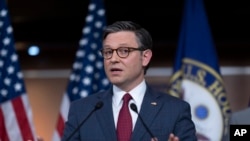U.S. President Joe Biden on Wednesday voiced his strong support for more military aid for Ukraine and Israel and humanitarian assistance for Palestinians in Gaza after House Speaker Mike Johnson said the House of Representatives will vote on the funding packages Saturday night.
Johnson had wavered for weeks about calling a vote on the foreign aid, with some right-wing lawmakers in his Republican caucus opposing more assistance for Ukraine’s two-year fight against Russia’s invasion and threatening to try to oust him from the speakership if he proceeded with a vote.
Biden, a Democrat, said in a statement, “Israel is facing unprecedented attacks from Iran, and Ukraine is facing continued bombardment from Russia that has intensified dramatically in the last month.”
“The House must pass the package this week and the Senate should quickly follow,” he said. “I will sign this into law immediately to send a message to the world: We stand with our friends, and we won’t let Iran or Russia succeed.”
In a Wall Street Journal opinion piece, Biden called the Senate-approved version of the Ukraine and Israel aid package "strong and sensible,” adding, "it shouldn't be held hostage any longer by a small group of extreme Republican House members."
The U.S. leader said Russian President Vladimir Putin “wants to subjugate the people of Ukraine and absorb their nation into a new Russian empire. The government of Iran wants to destroy Israel forever — wiping the world's only Jewish state off the map."
He said the weaponry to help Ukraine would be manufactured in the U.S., helping the American economy. Trying to allay the concerns of some of his fellow Democrats who oppose more funding for Israel’s war against Hamas militants, Biden said the package would "continue delivering urgent humanitarian aid for the people of Gaza."
Johnson told his Republican colleagues he will hold votes on three separate funding packages for Ukraine, Israel and U.S. allies in the Indo-Pacific, and address other foreign policy priorities in a fourth bill and U.S.-Mexico border security in a fifth measure.
Johnson proposed that the economic assistance for Kyiv be structured as forgivable loans, and that there be greater oversight on the funding. But the decision to even allow a vote on the Ukraine aid, which is likely to pass with robust support from Democratic lawmakers, angered populist Republican conservatives in the House.
Even getting to a rare Saturday night vote on the funding measures will need Democratic support on procedural votes before the spending packages can be considered.
Republican Representative Marjorie Taylor Greene of Georgia has threatened to try to force a vote to oust Johnson from the speakership, which makes him second in line to the presidency, if he goes ahead with the Ukraine aid vote. Another Republican, Representative Thomas Massie of Kentucky, said he was joining Greene and called for Johnson to resign.
"You are seriously out of step with Republicans by continuing to pass bills dependent on Democrats," Greene said of Johnson on the social media platform X. "Everyone sees through this."
In trying to satisfy conservatives, Johnson said he would hold a separate vote on a U.S.-Mexico border security package that encompasses most of a bill that was already passed by House Republicans last year, although it was rejected by the Democratic-controlled Senate.
Representative Mike Turner, the Republican chairman of the House Intelligence Committee, and Representative Jim Himes, the panel’s lead Democrat, issued a joint statement Tuesday saying that they had been informed in a classified briefing that there is a "critical need" to provide funding for Ukraine this week.
"The United States must stand against Putin's war of aggression now as Ukraine's situation on the ground is critical," the lawmakers said in a statement.
In a separate hearing on Wednesday, Pentagon leaders testified that Ukraine and Israel both desperately need more military weapons.
"We're already seeing things on the battlefield begin to shift a bit in Russia's favor," said Defense Secretary Lloyd Austin.
Some material in this report came from Agence France-Presse and The Associated Press.







